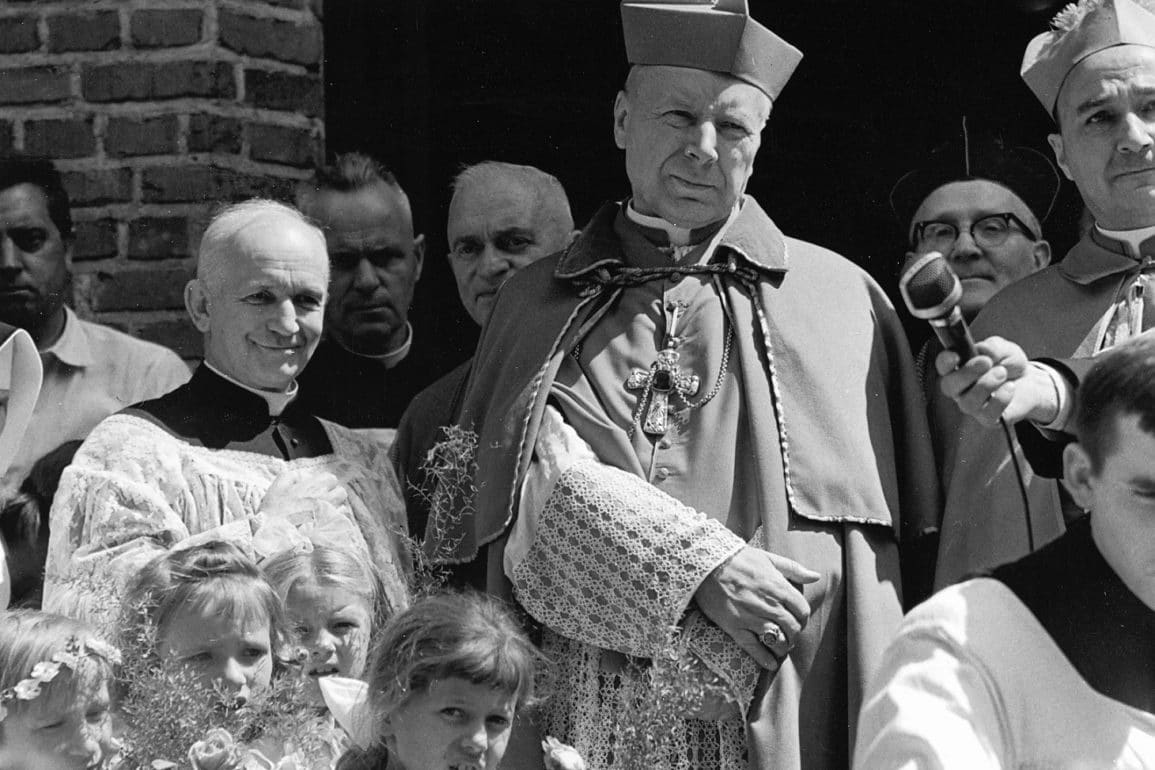During World War II, the priest, and professor Stefan Wyszynski, although threatened by German repressions, engaged in helping Jews. Later, as the Primate, he condemned the anti-Semitic campaign of the authorities of the People’s Republic of Poland in 1968. These are still largely unknown pages from the biography of the Cardinal, who will be elevated to the altars on September 12th.
In 2016, the daily Rzeczpospolita described how Fr. Wyszynski helped a Jewish family during the war. The newspaper related the account of Jadwiga Karwowska, whose parents worked on the Żułów estate in the region of Lublin. There, Franciscan Sisters ran an institution for the blind transferred from Laski near Warsaw. Father Wyszyński, who was hiding from the Gestapo, was also there.
As Jadwiga Karwowska recalls, the then 30-year-old priest was involved, among other things, in rescuing three members of a Jewish family. “It was a father with two children, Gołda and Szmulek. Their mother had died earlier. We became friends because the children were in my age.” This is what Mrs. Karwowska said in her account for the project “Priests for Jews.” Yet, neither Jadwiga Karwowska nor Sister Joanna Lossow, the superior of the Żułów house, remembered the name of the family that was saved. According to the Sister’s account, all three were murdered after being denounced by a Ukrainian nationalist. Jadwiga Karwowska recalls that Fr Wyszyński “directed the aid” for Jews on the Żułów estate, and she herself describes the priest’s “pupil.”
This is not the only account confirming the involvement of the future Primate of the Millennium in saving Jews from the Holocaust. The Yad Vashem Institute in Jerusalem has the testimony of Esther Grinberg (file O.3/V.T/862). A woman from Międzyrzec Podlaski was the only member of her family to survive. She found herself in Warsaw during the ghetto uprising in 1943. Grażyna Winiarska was hiding her. Esther Grinberg twice points out that Fr. Stefan Wyszyński ordered the faithful to help those who escape from the “fire of war.” The priest did not say specifically who should be helped, mainly for safety reasons, but it was known at the time that he was referring to Jews trying to escape from the ghetto to the so-called “Aryan” side.
An important testimony regarding Cardinal Stefan Wyszyński’s attitude towards Jews was his stance in 1968. At that time, the communist authorities suppressed student protests in many Polish cities. Moreover, just a few months earlier, the Communists had unleashed an anti-Semitic campaign that entered a decisive phase during the March 1968 protests.
“In fact, everything must be attributed to the internal games within the government of the Polish People’s Republic. The political authorities at the present time want to limit themselves to a crackdown on ‘Zionism’ and ‘warmongers.’ They want to outmaneuver the academic youth, the workers, and the Church,” wrote Cardinal Stefan Wyszynski in his personal notes on 18 March 1968. A few days earlier he had already defended the beaten students, calling for peace. On 10 March he gave a sermon “On capital’s Way of the Cross,” referring to the situation on the streets of Warsaw.
Furthermore, on March 18th, Primate Wyszynski noted that, so far, the only “opponent to the authorities has been dissatisfaction.” “Since only the Episcopate tells the government and the party the truth. Everyone else spared them. Later came the ‘33.’ Then, the writers. And now the young people. (…) The people must be believed. The citizens’ truth and courage are important for rulers. When these virtues are absent the government finds itself surrounded by error,” Cardinal Wyszynski assessed.
He also expressed his opposition to the anti-Semitic campaign later. As Dr. Ewa K. Czaczkowska told the Polish Press Agency in 2018, in his homily on 11 April 1968, he mentioned the duty to love everyone, regardless of speech, language, or race. “The former Chief Rabbi of Poland, Zew Wawa Morejno, thanked Primate Wyszynski for this attitude toward Jews, both in 1968 and 1971,” added the biographer of the Primate of the Millennium. Moreover, during the Six-Day War in 1967, the Cardinal, in contrast to the authorities of the Polish People’s Republic, who supported the Arab side, supported Israel. At the same time, Dr. Czaczkowska admitted that the Episcopate did not refer to March 1968 in its public statement, because the bishops believed that the wave of anti-Semitism was due to factional fights within the party.
Cardinal Stefan Wyszyński was also a member of the presidium of the Second Vatican Council, which adopted the declaration Nostra Aetate on the Church’s attitude towards non-Christian religions. The most extensive point of the document concerned the relationship with Judaism. It said that the Church, which condemns all persecutions, remembering the heritage shared with the Jews, is moved “not by political reasons but by the Gospel’s spiritual love, decries hatred, persecutions, displays of anti-Semitism, directed against Jews at any time and by anyone.” Therefore, one can say that these words were fulfilled by the activities of the priest and later Cardinal and Primate Wyszynski before and after the Council.
FNS










